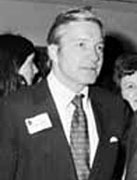 Biography Pages of the:
Biography Pages of the:LANDON LECTURES
 |
Sen. Charles H. Percy
U.S. Senator, Illinois |
During his time in the U.S. Senate, Charles H. Percy, a progressive Republican who harbored unrealized aspirations for the presidency, embodied an era when independence and political pragmatism were often valued commodities compared with the ideological and party purity rewarded today.
First elected in 1966, the three-term senator and Navy veteran was an outspoken opponent of the Vietnam War. Percy backed consumer protection and environmental efforts and tougher enforcement of drug laws. He supported international nuclear nonproliferation. He offered a more thoughtful, less political method of recommending federal judges and prosecutors.
At the same time, he earned the enmity of conservative Republicans nationally and at home. He was the first senator to call for a special prosecutor to investigate Watergate, the political dirty tricks scandal that brought down Richard Nixon's presidency. Nixon, who once viewed Percy as a rival for the GOP nomination, viewed the senator with contempt and placed him on the notorious White House "enemies" list.
Percy, a brilliant businessman with striking looks and a deep room-filling voice, represented Illinois for nearly 20 years in the Senate and headed the chamber's powerful Foreign Relations Committee. He died Saturday at a Washington, D.C., hospice at the age of 91.
In March 2009, Percy's daughter, Sharon, the wife of Sen. John D. Rockefeller, D-W.Va., disclosed publicly that the former senator had Alzheimer's disease.
"The energy and enthusiasm he brought to everything in his many-faceted life encouraged us to rise early and to embrace each day's opportunities for work and fun until late at night, and buoyed us up when we flagged," the Rockefeller family said in a statement. "His courage in the face of devastating adversity made us braver and taught us resilience. His insistence on a balanced perspective in his public life, (calling himself 'fervently moderate'), helped us understand it is both possible and preferable to live in a world without partisanship."
Percy entered the Senate in 1967 after defeating one liberal icon, Paul Douglas in the 1966 election. But he was ousted by voters when they elected another Democratic icon, Paul Simon, in 1984.
"Chuck Percy was a political opponent in the Douglas and Simon campaigns but always a friend," said Sen. Dick Durbin, the state's senior senator and No. 2 ranking Democrat in the chamber. "That statement reflects a better moment in American politics and a man who was always viewed as honorable and honest in his representation of our state."
Republican Sen. Mark Kirk said Percy's "brand of moderate fiscal conservatism will be missed."
Percy, a Christian Scientist who neither drank alcohol nor smoked, was a health advocate. No day on the campaign trail began without Percy swimming laps in a hotel pool.
He became chief executive of Bell & Howell Corp., then a manufacturer of projectors, cameras and other motion-picture equipment, in 1949 at the age of 29, becoming the youngest person to head a major corporation at that time. He resigned in 1963 to make his first bid for major elective office, an unsuccessful run for governor against Democratic Gov. Otto Kerner.
But even before launching his political career, Percy was seen as a potential president of the United States by such influential admirers as former President Dwight D. Eisenhower. He was only 40 years old and never had held public office when Richard Nixon approached him about the vice presidency in 1960. Soon afterward, John Kennedy rated Percy one of the most promising newcomers on the political scene.
In the mid-1960s, Percy made the cover of Time magazine as heir apparent to the Nelson Rockefeller wing of the Republican Party. In 1968, Percy was touted by The New York Times' James Reston as "the hottest political article in the Republican Party." Barry Goldwater suggested that Percy could be his party's most formidable candidate. And Nixon thought the freshman senator from Illinois was his most threatening rival for the nomination.
"Percy and Nixon are 2-1" odds for the nomination, Nixon observed privately in the winter of 1967. "(Ronald) Reagan is 4-1. Rocky (Nelson Rockefeller) has no chance at all."
But in a private meeting with Nixon, the Illinois senator took himself out of contention for the nomination, saying that he lacked experience for the presidency. Though Percy was eager to be considered for the vice presidency, he killed his chances by supporting Rockefeller over Nixon for the presidential nomination. Many conservatives never forgave him and Nixon regularly disparaged him.
Photo obtained from: http://www.nndb.com
Biography obtained from: http://articles.chicagotribune.com